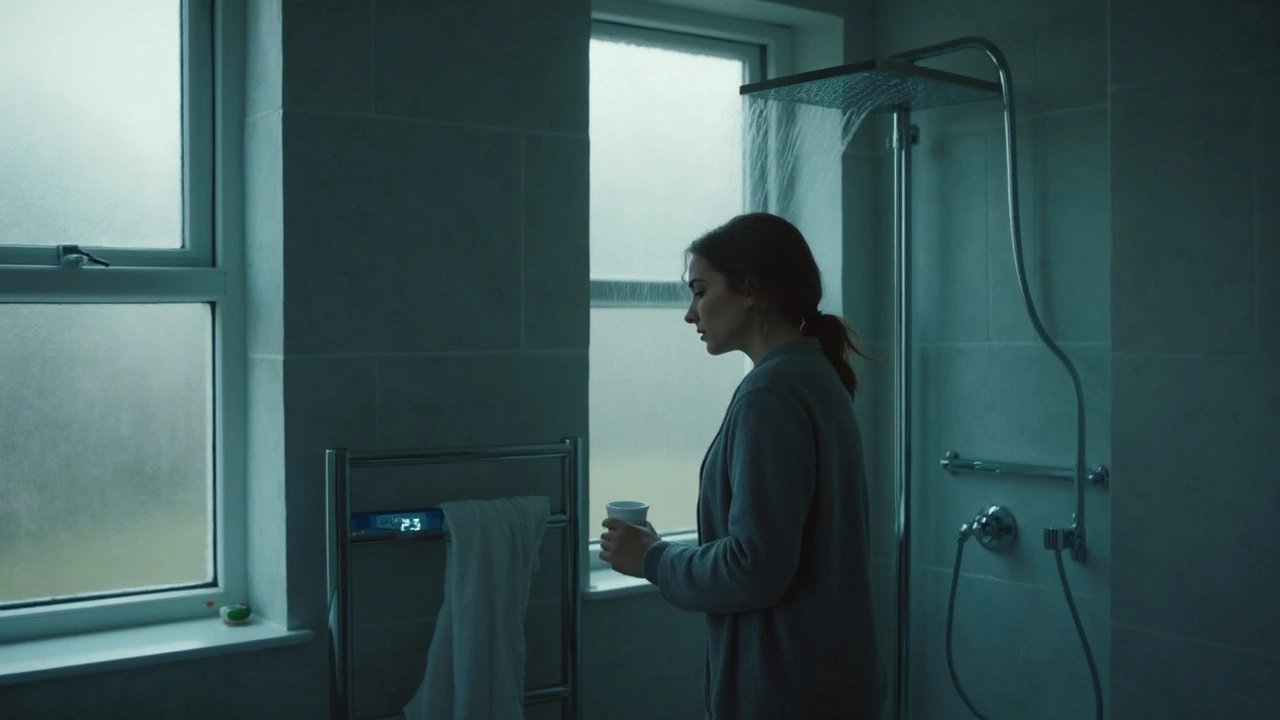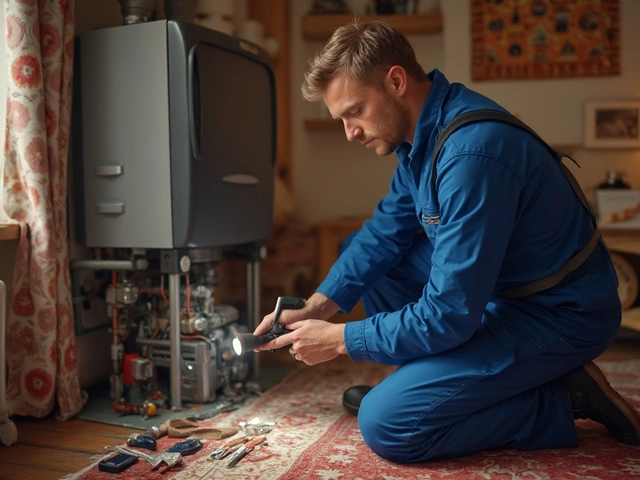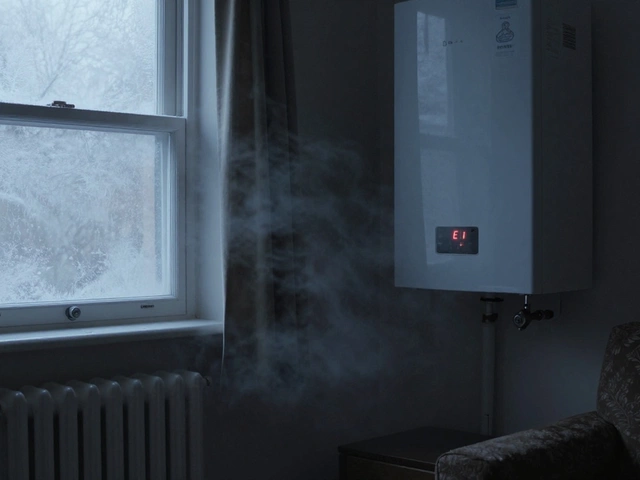Your boiler’s dead and you’re standing in the bathroom, towel in hand, wondering if you can actually pull off a shower. If you’ve ever had to do the classic cold-water hop, you know it can be brutal—especially first thing in the morning. It’s not just about comfort, either: If you’ve got kids to scrub or just need to stay fresh for work, not having hot water is a real headache.
Most boilers aren’t just for radiators; they also handle your hot water. When they go kaput, your shower turns icy in seconds. If you’re lucky and have an electric shower (the type with its own heater box), you might still get hot water. But if your home runs mostly off the boiler, it’s an arctic blast every time you twist the tap.
The good news? You’re not totally out of options. There are a few tricks for getting clean while you wait for the repair guy to show up, and some actually work better than you’d think. I’ve tried most of them (thanks to an old rental and a child with a knack for accidentally bumping the thermostat), and I can promise you, there are ways to not freeze your eyebrows off while staying clean-ish.
- What happens to your shower when the boiler breaks?
- Quick fixes for getting clean without hot water
- Are cold showers safe and practical?
- Workarounds if you have kids or special needs
- When to call for boiler repair
- Tips to prevent future boiler letdowns
What happens to your shower when the boiler breaks?
So, the boiler conks out—and boom, no more hot water. If you use a regular mixer or a power shower that gets its hot water straight from the boiler, you’re basically stuck with whatever temperature the cold tap spits out. For most families in the UK and many homes elsewhere, the shower water instantly runs cold. Makes you appreciate that hot shower a lot more, right?
Here’s the breakdown for most setups:
- Mixer showers: These mix hot and cold water from your home’s pipes. When the boiler fails, no hot water comes through, so the shower is cold.
- Power showers: These still just pump water, and it’ll be just as cold if there’s no hot stuff coming from the tank or boiler.
- Electric showers: These are the wildcard. If you’ve got one, it has its own heating element. So, you might not notice a huge difference if the boiler breaks. But if your shower’s not electric, you’re out of luck.
One thing a lot of people don’t realize—if your home runs off a combi boiler, not only do you lose hot water, but you also usually lose central heating. That means, in winter, the bathroom gets cold too. Talk about adding insult to injury.
And don’t forget, even if you have a hot water tank (cylinder), it only helps if it’s electric or has immersion heating. No immersion? No hot shower.
| Shower Type | Hot Water Without Boiler? |
|---|---|
| Mixer Shower | No |
| Power Shower | No |
| Electric Shower | Yes |
| Thermostatic Shower | No |
If you’re not sure what kind of setup you have, check your shower controls or ask your landlord or a plumber. Knowing this stuff isn’t just trivia—it helps you figure out your options if the boiler goes on strike.
Quick fixes for getting clean without hot water
If your boiler repair can’t happen right away, there are a few ways to stay fresh—none of them involve just suffering through a polar bear shower (unless that’s your thing). The best option depends on what you’ve got at home and how desperate you’re feeling.
- Boil water in a kettle or pot: It’s basic but effective. Fill a couple of kettles, mix the hot water with cold in the bath, and wash up the old-fashioned way. Grab a large jug or a camping shower head for rinsing. My daughter Callista has declared “bucket showers” surprisingly fun, although her standards are questionable when it comes to getting to play with water everywhere.
- Microwave method: In a pinch, microwaving water in bowls (careful, it gets hotter than boiling on the stove) can help top up a sink or basin for a warm flannel wash.
- Sink wash or ‘hobo bath’: Fill your sink with the warmest water you can wrangle, grab a washcloth, and go for the essentials—pits, bits, and feet. Hospitals have been getting people clean this way for decades. Don’t stress about a full hair wash every day; dry shampoo or a turban wrap can keep greasy hair under control.
- Baby wipes or no-rinse wipes: There’s a reason hikers and parents swear by these. They’re cheap, disposable, and surprisingly effective for a couple of days if you avoid sensitive areas. Just don’t flush them—they clog pipes faster than you’d expect and plumbers hate it.
- Gym or leisure centre: If access allows, use the hot showers at your local gym. Many places offer a day pass if you just need a single shower with broken boiler situation. It doubles as a reason to squeeze in a quick workout, if you’re feeling productive.
If you want to compare the heat of these quick fixes, here’s a rough idea of how much hot water you'll get from common methods:
| Method | Average Hot Water (Litres) |
|---|---|
| One Kettle (1.7L) | 1.7 |
| Standard Washing Up Bowl | 5–8 |
| Baby Wipes Pack | – |
| Leisure/Gym Shower | Unlimited |
Honestly, none of these are perfect, but they’ll get you through the rough patch until your no hot water solutions become unnecessary. Stay creative, and you might even discover a new appreciation for modern plumbing when the boiler repair is done.
Are Cold Showers Safe and Practical?
This is the big question when your boiler repair person can’t make it for two more days: Are cold showers actually safe? For most healthy people, yes—they won’t harm you. But it's not exactly everyone’s favorite way to wake up. If you have heart issues, asthma, or young kids, a sudden blast of icy water can be a shock your body won’t love. The NHS even mentions that cold water can trigger breathing problems in people with certain conditions.
On the flip side, cold showers aren’t all bad. Some pro athletes and trainers swear by them for muscle recovery. They can also boost circulation and some folks even say they help with mood (though nobody in my house was ever cheered up by a freezing rinse, no matter how many studies I quoted). Here’s a quick look at what cold showers can—and can't—do for you:
- No hot water solutions: Cold showers get you physically clean, but might not do much for relaxation.
- Tough for kids and older folks: Their bodies lose heat faster so a cold shower isn’t a great idea.
- Quick and safe for healthy adults: If you keep it short and avoid extremely cold weather, you should be fine.
- Possibly helpful for post-workout recovery: Some studies show cold water can help with muscle soreness.
As Dr. Chris van Tulleken, infectious diseases doctor and BBC presenter, puts it:
“Short cold showers are unlikely to do real harm, but don’t force yourself or your children if you’re feeling faint, unwell, or chilled. There’s no magical health benefit and comfort matters, too.”
If you have to take a cold shower, here are some survival tips:
- Get in and out fast—no lingering.
- Start by wetting your limbs before your chest and head. It feels less harsh.
- Keep a warm towel or robe close by.
So, can you shower with a broken boiler? With a gulp and a deep breath, yes—unless you’re in a group that should skip it. Shower with broken boiler isn’t the dream, but for most of us, it’s totally doable (if not a little painful at first).
| Group | Safe for Cold Showers? |
|---|---|
| Healthy Adults | Yes, but keep it quick |
| Young Children | Avoid if possible |
| Seniors | Best to avoid |
| People with Heart/Asthma Issues | Not recommended |

Workarounds if you have kids or special needs
Dealing with a broken boiler gets trickier when you've got little ones, elderly family, or anyone who can't handle a frigid splash. Kids can’t just grit their teeth and jump into a cold shower the way adults sometimes do. Sensitive skin, sensory needs, or medical conditions all make this more complicated.
If you need to keep them clean and can't hack the cold, here’s what actually works:
- Boil a kettle or pot: Fill the kettle and a big saucepan with water and get both boiling. Pour them into a bath with enough cold water to bring it down to a safe temperature. Never put kids in water that’s too hot—test with your elbow first, because even a few degrees too hot can cause scalds.
- Portable electric water heaters: These are a lifesaver (if you already have one). Plug it in, fill a bucket, and heat up just enough water for a quick sponge bath.
- Sponge baths (flannel wash): This one’s the old standby. Fill a bowl with warmed-up water, use a flannel, and clean face, hands, underarms, and anywhere that needs freshening up. It does the job until the boiler’s back. For babies, keep them wrapped up throughout so they don’t get chilled.
- Wet wipes: Not for every day, but in a pinch they’ll get you through. Baby wipes are gentle, but for really sticky kid messes, go with sensitive-skin versions meant for adults.
- Skip the hair wash: If you can, just tie hair back or use a dry shampoo until things are back to normal.
Got a workout routine or a kid fresh from football? Prioritize hygiene zones—armpits, groin, and feet—until you can bathe properly. Fun fact: according to parents surveyed by Mumsnet, over 60% say they use bowl or kettle baths when their kids can’t have a proper soak due to heating breakdowns.
If anyone in your family is very young, very old, or medically fragile and can’t safely handle temperature changes, don’t stretch it too long—ring up a neighbor or relative if possible, or check if your local council offers emergency facilities. Stay warm, stay clean, and keep your routines as normal as you can.
When to call for boiler repair
There’s DIY, and then there’s knowing when to ring the professionals. Not every boiler repair is a job for a YouTube tutorial and a screwdriver. If your broken boiler is leaving you cold during shower time, here’s how to decide when it’s time to call for real help.
- If the boiler won’t fire up at all, even after you’ve checked the basics (like power supply, thermostat settings, and pilot light). Sometimes you get lucky with a simple reset, but if it’s still stubborn, call an expert.
- Strange noises like banging, clunking, or whirring from inside the boiler. This could mean a mechanical issue—don’t ignore it. Boilers aren’t supposed to sound like old washing machines with sneakers inside.
- Water leaks around the boiler or pipes. Any water outside of where you want it is a bad sign, and you don’t want to risk water damage or a potential safety hazard.
- No hot water anywhere in the house for an extended time, not just the shower. If the tap, bath, and kitchen all serve ice water, your boiler might be the culprit and probably needs proper attention.
- Warning lights on the boiler display or error codes. Most modern boilers flash a specific code if something’s up. Don’t just ignore the error—those codes exist for a reason.
- The smell of gas or burning. Never try to fix this yourself. Get out of the house and call the emergency gas service and a qualified engineer. Safety first, always.
Here’s a quick visual guide of what usually pushes folks to pick up the phone for boiler repair:
| Problem | DIY or Call a Pro? |
|---|---|
| No power / simple reset issues | Try DIY first |
| Leaking water | Call a Pro |
| Strange noises | Call a Pro |
| No hot water anywhere | Call a Pro |
| Gas smell | Emergency, call a Pro ASAP |
For anything safety-related, don’t risk it. Boilers involve electricity and gas—two things you don’t want to mess with if you’re not trained. Even if you hate spending on repairs, a dodgy fix now can cost way more in the long run if something goes bang. For peace of mind and your family’s safety, professional boiler repair is usually money well spent.
Tips to Prevent Future Boiler Letdowns
If you’ve ever Googled “boiler repair” at 6AM, you know the importance of keeping your boiler in shape. Most breakdowns aren’t total flukes—they’re usually because something small got ignored. Here’s the lowdown on dodging emergency calls and ice-cold showers next winter.
- Don’t skip annual servicing. Getting a pro in once a year means they’ll spot problems before your boiler bails on you. In the UK, research shows that boilers with regular check-ups last 2-3 years longer.
- Bleed your radiators every autumn. If your radiators feel patchy (hot at the bottom, cold at the top), air might be stuck in there. Bleeding your radiators helps everything run smoother and stops your boiler from overworking.
- Keep an eye on the pressure gauge. Boilers work best at about 1-2 bars pressure. If it’s too low (or spiking high), dig out the manual and adjust it or call an expert if you’re unsure. Weird pressure means your whole heating system is struggling.
- Know where the shut-off valves and reset buttons are. When something goes wrong, being able to quickly turn off water or reset the system can stop bigger disasters.
- Insulate pipes, especially in winter. Burst or frozen pipes trip up even good boilers. Simple pipe lagging costs peanuts and can save you a fortune (not to mention a plumbing bill).
- Check for leaks and odd smells. Water on the floor, or a smell like rotten eggs (which can mean a gas leak)—both need urgent attention. Don’t ignore weird noises, either. Clanking and booming usually mean trouble is brewing.
If you want some numbers on why this matters, just look at cost savings. Regular servicing can cut breakdown risk by nearly 85%. That’s way less stress about no hot water solutions during a busy week.
| Prevention Step | Average Cost | Typical Savings |
|---|---|---|
| Annual Service | £70-£120 | £200+ (per major breakdown avoided) |
| Pipe Insulation | £15-£30 (DIY) | £300+ (if pipe bursts avoided) |
Bottom line: a little attention now means you probably won’t be huddled in a towel, cursing your broken boiler when winter rolls around.




